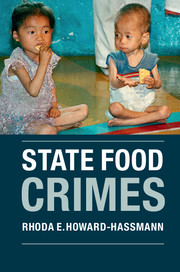Book contents
- Frontmatter
- Dedication
- Contents
- Acknowledgments
- Part I Introduction and Background
- Part II Contemporary Case Studies
- Part III Implications for the International Human Right to Food
- 8 International Law and the Right to Food
- 9 Sticks and Carrots: Sanctions and Food Aid
- 10 Interdependent Human Rights
- 11 Liberal Democracies and the Right to Food
- 12 A New International Treaty on the Right to Food
- Bibliography
- Index
8 - International Law and the Right to Food
from Part III - Implications for the International Human Right to Food
Published online by Cambridge University Press: 05 August 2016
- Frontmatter
- Dedication
- Contents
- Acknowledgments
- Part I Introduction and Background
- Part II Contemporary Case Studies
- Part III Implications for the International Human Right to Food
- 8 International Law and the Right to Food
- 9 Sticks and Carrots: Sanctions and Food Aid
- 10 Interdependent Human Rights
- 11 Liberal Democracies and the Right to Food
- 12 A New International Treaty on the Right to Food
- Bibliography
- Index
Summary
Changes in international law and practice might help protect people from state-induced famine and malnutrition. International laws prohibiting genocide and crimes against humanity, the international law of occupation, and refugee law could all be used to remedy such crimes. This chapter will first discuss these four types of law, and will end with brief discussions of international law regarding penal starvation, and evolving soft law. North Korea, Zimbabwe, Venezuela, and Israel/Palestine raise different questions regarding international law; not all types of law apply to each case.
The International Law of Genocide
The state food crimes described in Part II fall most precisely into the legal category of crimes against humanity. However, critics sometimes claim that North Korea, Zimbabwe, and Israel have committed or are committing genocide. It is necessary to dispose of these arguments before proceeding to discuss crimes against humanity.
The 1948 United Nations Convention on the Prevention and Punishment of the Crime of Genocide (UNGC) contains no specific mention of state-induced famine, although some consequences of intentional and reckless faminogenesis could be described as aspects of genocide. The definition of genocide in Article 2 of the UNGC is:
any of the following acts committed with intent to destroy, in whole or in part, a national, ethnical [sic], racial or religious group, as such:
(a) Killing members of the group;
(b) Causing serious bodily or mental harm to members of the group;
(c) Deliberately inflicting on the group conditions of life calculated to bring about its physical destruction in whole or in part;
(d) Imposing measures intended to prevent births within the group;
(e) Forcibly transferring children of the group to another group (United Nations General Assembly 1948a, Article 2)
Intentional state-induced famine kills people, the first aspect of genocide (Article 2, a of the UNGC). It causes serious bodily harm to members of groups (Article 2, b of the UNGC) and also deliberately inflicts “conditions of life calculated to bring about [a group's]…physical destruction in whole or in part” (Article 2, c of the UNGC.). State-induced famine also prevents births within a group (Article 2, d of the UNGC) as starving women cannot conceive.
- Type
- Chapter
- Information
- State Food Crimes , pp. 135 - 155Publisher: Cambridge University PressPrint publication year: 2016



